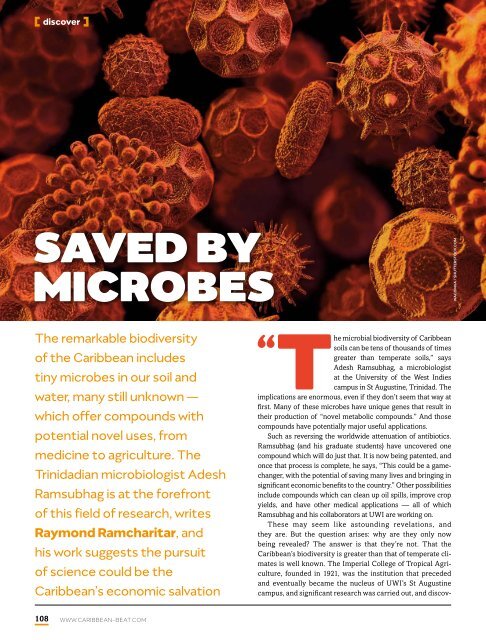Caribbean Beat — January/February 2019 (#155)
A calendar of events; music, film, and book reviews; travel features; people profiles, and much more.
A calendar of events; music, film, and book reviews; travel features; people profiles, and much more.
You also want an ePaper? Increase the reach of your titles
YUMPU automatically turns print PDFs into web optimized ePapers that Google loves.
discover<br />
Saved by<br />
microbes<br />
“<br />
The microbial biodiversity of <strong>Caribbean</strong><br />
soils can be tens of thousands of times<br />
greater than temperate soils,” says<br />
Adesh Ramsubhag, a microbiologist<br />
at the University of the West Indies<br />
campus in St Augustine, Trinidad. The<br />
implications are enormous, even if they don’t seem that way at<br />
first. Many of these microbes have unique genes that result in<br />
their production of “novel metabolic compounds.” And those<br />
compounds have potentially major useful applications.<br />
Such as reversing the worldwide attenuation of antibiotics.<br />
Ramsubhag (and his graduate students) have uncovered one<br />
compound which will do just that. It is now being patented, and<br />
once that process is complete, he says, “This could be a gamechanger,<br />
with the potential of saving many lives and bringing in<br />
significant economic benefits to the country.” Other possibilities<br />
include compounds which can clean up oil spills, improve crop<br />
yields, and have other medical applications <strong>—</strong> all of which<br />
Ramsubhag and his collaborators at UWI are working on.<br />
These may seem like astounding revelations, and<br />
they are. But the question arises: why are they only now<br />
being revealed? The answer is that they’re not. That the<br />
<strong>Caribbean</strong>’s biodiversity is greater than that of temperate climates<br />
is well known. The Imperial College of Tropical Agriculture,<br />
founded in 1921, was the institution that preceded<br />
and eventually became the nucleus of UWI’s St Augustine<br />
campus, and significant research was carried out, and discovwacomka<br />
/ shutterstock.com<br />
The remarkable biodiversity<br />
of the <strong>Caribbean</strong> includes<br />
tiny microbes in our soil and<br />
water, many still unknown <strong>—</strong><br />
which offer compounds with<br />
potential novel uses, from<br />
medicine to agriculture. The<br />
Trinidadian microbiologist Adesh<br />
Ramsubhag is at the forefront<br />
of this field of research, writes<br />
Raymond Ramcharitar, and<br />
his work suggests the pursuit<br />
of science could be the<br />
<strong>Caribbean</strong>’s economic salvation<br />
108 WWW.CARIBBEAN-BEAT.COM


















